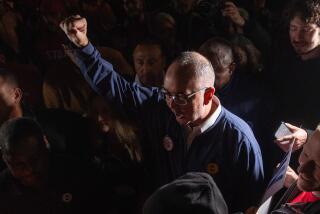Caterpillar Bars Returning Workers From Factories : Labor: The company says some employees will not be rehired because of their actions during strike. Talks may be harmed.
- Share via
DETROIT — A day after the once-mighty United Auto Workers union agreed Tuesday to return to work without a contract following a five-month strike, officials at Caterpillar Inc. barred the 13,000 workers from factory gates and said some of them would not be rehired.
Caterpillar’s action after the UAW’s surprise agreement to return to work seemed likely to further poison the atmosphere at the bargaining table, effectively adding a tough new issue to the difficult and prolonged dispute. In response, the union leaders scrambled to put the best possible face on their predicament, saying the company risked further alienating the work force.
The company told its workers not to return until notified, probably next week. Managers said some would be fired for strike-related activities and others would not be needed because of factory efficiencies discovered during the strike.
“They certainly got off to an inauspicious start,” said Harley Shaiken, a labor professor at UC San Diego and longtime UAW follower. “That falls in the category of kicking someone when they’re down.”
Dave Risinger, vice president of UAW Local 974 and a Caterpillar pipe fitter, said workers felt deceived.
“They led people to believe that they would be allowed back in to work immediately,” Risinger said. “Our guys went to the gates this morning and they wouldn’t let them in.”
The UAW leadership called the agreement to return--under terms of a company proposal it had earlier rejected--a “recess” of the walkout while it resumes negotiations.
The two sides had agreed Tuesday to resume talks at the urging of Bernard DeLury, director of the Federal Mediation and Conciliation Service, who had begun talking with the company and the union a day earlier. The union agreed to send its members back to work in return for Caterpillar dropping its efforts to hire replacement workers.
“I don’t think we lost a round,” insisted Owen Bieber, president of the UAW, at an appearance in Detroit. “We acquiesced to what the mediator asked. We are not ruling out any of our options.”
Bieber had no direct comment on the barring of UAW members from returning to work, speculating that employees who had been running the plants during the strike might have “screwed things up” or that Caterpillar had lost business because of the strike and does not need full production.
But an undisclosed number have been fired because of “disciplinary reasons” related to their behavior on the picket lines, said company spokesman Keith Butterfield, and many more will not be rehired because the company has decided they are no longer needed.
Workers who operated the plants during the strike period found “a number of areas in which we found that we could do things more efficiently,” Butterfield said. He did not say how many workers may not be rehired.
The question of rehiring all the strikers “will be one of the biggest items in the talks right now,” said labor economist Audrey Freedman, president of Manpower Plus, a human resources consulting firm in New York. “The union will be screaming bloody murder.”
Nearly all first-shift workers returned to work at plants in East Peoria, Mossville, Aurora and other Illinois locations and were turned away without incident.
Despite the widespread impression of a major defeat for the UAW, long one of the nation’s premier labor unions, UC’s Shaiken said the 900,000-member organization had at least averted an outright busting of the union and headed off the hiring of replacement workers.
“The hiring of replacement workers would have been a point of no return,” he said. “It would have been a debacle. This was more of a strategic retreat.”
But the union’s leverage seemed badly weakened, and the prospect of getting its workers back out on strike seemed remote. Bieber sought to downplay the principle of preserving so-called pattern bargaining--the negotiation of uniform labor agreements across industries--that was at the heart of the UAW-Caterpillar confrontation.
The union wanted the same contract at Caterpillar as it negotiated at John Deere Inc., the agriculture equipment maker. Officials at Caterpillar said the firm could not afford that and remain competitive internationally.
On Wednesday, Bieber said: “These aren’t cookie-cutter pattern contracts in the first place.”
Economist Freedman, noting the financial hardships faced by the strikers, said Bieber’s remarks on pattern bargaining indicate that the union “is responding to its members as it is supposed to. The UAW was maintaining a principle at the expense of its own members. That is not proper. The workers got through to the leadership.”
But in addition to displeasure over the company’s actions Wednesday morning, many workers were less than happy with the UAW’s agreement to return to work under the terms of a final contract offer that Caterpillar unilaterally imposed April 6.
The company’s last offer would raise top minimum pay for workers already employed from $35,318 annually to $39,915 by September, 1994. The union wants top minimum pay of $40,458 annually by September, 1994, and does not want new workers hired at lower pay than the rest of the work force.
Risinger acknowledged that the resolve of many union members was weakening after five months. “A lot of people wanted to get something done,” he said. “It probably made some of them happy by the strike ending.”
Woutat reported from Detroit and Harrison from Chicago.






